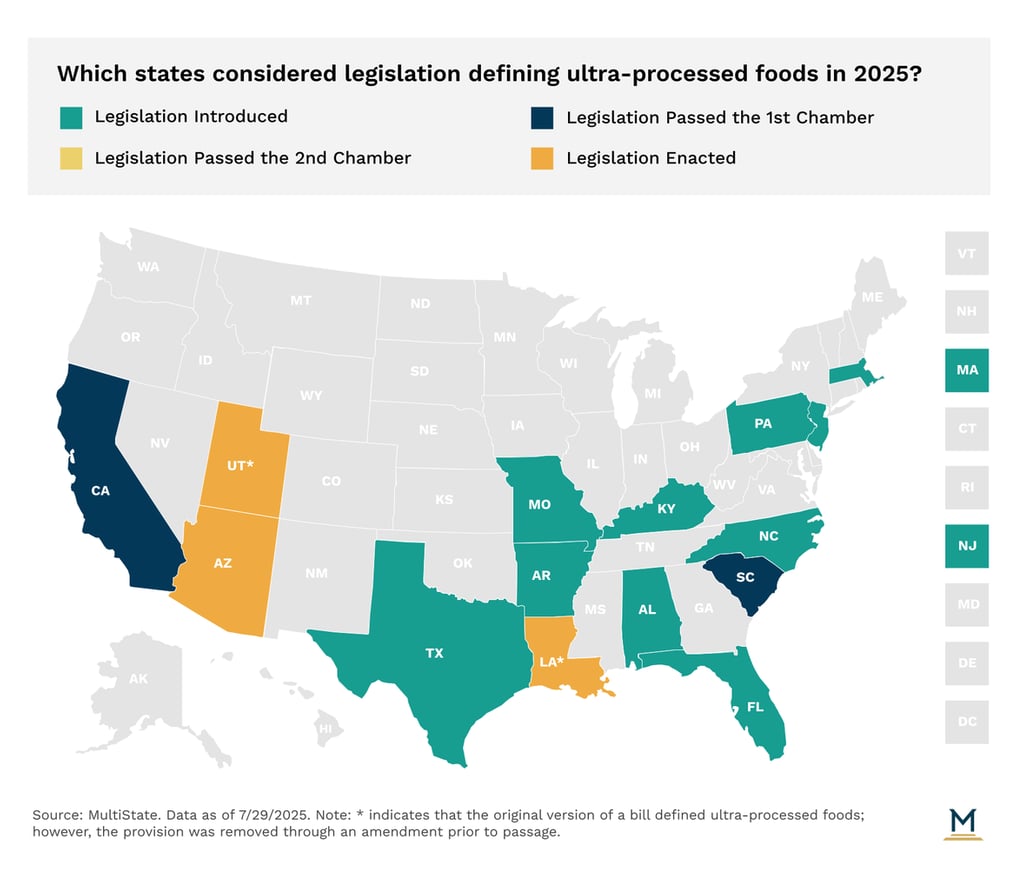California Becomes First State to Define Ultra-Processed Foods


Understanding Ultra-Processed Foods
Ultra-processed foods (UPFs) refer to products that are industrial formulations made primarily from substances extracted from foods, such as oils, fats, sugars, starches, and protein isolates, alongside additives and preservatives that enhance flavor, texture, and shelf life. These items typically contain ingredients not found in a home kitchen, which makes them distinct from minimally processed foods and whole foods, the latter of which retain most of their natural characteristics.
Examples of ultra-processed foods include sugary beverages, packaged snacks, instant noodles, and ready-to-eat meals. Items like sweetened breakfast cereals and processed meats also fall under this category. Such foods are a significant part of many modern diets, often being more accessible and attractive than whole foods. They are usually designed to be convenient, cheap, and appealing, which can contribute to their widespread consumption.
The distinguishing characteristic of UPFs is their high levels of added sugars, unhealthy fats, and sodium, which can negatively influence nutritional value. Unlike whole foods, such as fruits, vegetables, whole grains, and unprocessed meats, UPFs are often low in essential nutrients and high in calories, which may contribute to a range of health issues, including obesity, heart disease, and diabetes. Studies indicate that diets high in ultra-processed foods are correlated with increased health risks and adverse health outcomes.
The growing prevalence of these products in dietary patterns has raised significant public health concerns, prompting discussions on their impact on overall well-being. Understanding the nature of ultra-processed foods and their effects on health is crucial as researchers and policymakers aim to guide dietary choices and improve health outcomes within communities. By addressing the challenges posed by UPFs, society can work towards fostering healthier eating habits and enhancing public awareness.
California's Historic Legislation
In a significant move aimed at enhancing public health, California has enacted pioneering legislation that explicitly defines ultra-processed foods (UPFs). This groundbreaking law arose from growing concerns regarding the impact of excessive consumption of such foods on the state's health outcomes. Key provisions of this legislation include a comprehensive legal definition of UPFs, which categorizes these foods based on their processing methods and nutritional content. The law stipulates that products falling within this definition must adhere to specific labeling requirements, thereby providing consumers with clear and accessible information.
The rationale behind the implementation of this law is multifaceted. With the persistent rise in diet-related diseases, California legislators have emphasized the necessity of transparency within the food system. By educating consumers on the nature of UPFs, the state aims to promote healthier dietary choices and reduce adverse health impacts associated with excessive intake of processed foods. Notably, this legislation aligns with existing food safety and labeling laws in California, enhancing the overall regulatory framework pertaining to food products available to consumers.
This legislative endeavor involved collaboration among various stakeholders, including public health advocates, nutritionists, lawmakers, and representatives from the food industry. Advocates for the law have highlighted its potential to influence food manufacturers and retailers by fostering a culture of accountability in food production. The expectation is that as companies adjust to the new legal requirements, there will be a gradual shift in product formulations toward healthier options, ultimately benefiting consumers.
Throughout the legislative process, public hearings and discussions with industry experts have shaped the provisions of this law. California's initiative serves as a model for other states, establishing a framework that prioritizes consumer awareness and health. This legislation is an essential step in promoting sustainable dietary practices in the state and beyond, and it underlines California's leadership in addressing dietary health issues.
Public Health Implications of Ultra-Processed Foods
The consumption of ultra-processed foods (UPFs) has garnered significant attention from public health experts, particularly due to their strong associations with various chronic health conditions. Numerous studies have identified a direct correlation between the intake of UPFs and the rising prevalence of obesity, cardiovascular diseases, and type 2 diabetes. These foods, often characterized by high levels of added sugars, unhealthy fats, and artificial additives, tend to be calorie-dense yet nutritionally poor. As a result, they can contribute to overeating and cravings, further exacerbating the obesity epidemic.
Research indicates that the regular consumption of UPFs may lead to detrimental effects on one's overall health. According to a study published in the "British Medical Journal," individuals who consume high amounts of ultra-processed foods exhibit a 30% increase in the risk of heart disease compared to those who limit their intake. Moreover, the World Health Organization classifies excessive sugar consumption as a risk factor for numerous health issues, underscoring the significance of addressing the quality of food choices made by the public.
Beyond individual health, the broader societal implications of a diet high in UPFs are noteworthy. Schools play a pivotal role in shaping the dietary habits of children, and legislation targeting ultra-processed foods could have transformative effects on school meal programs. Implementing stricter guidelines that limit UPFs in school lunches not only promotes healthier eating among students but also contributes to long-term health benefits that reduce the future burden on public health systems.
By enacting laws that define and regulate UPFs, California is taking important steps toward fostering healthier eating habits among its residents. This legislative initiative may set a precedent for other states to follow, ultimately contributing to improved public health outcomes and a reduction in diet-related diseases.
The Global Context and Future Outlook
California's unprecedented legislation defining ultra-processed foods (UPFs) marks a significant turning point in the ongoing global discourse surrounding food safety and nutrition. Across various regions, there has been a discernible increase in awareness and concern regarding the health implications of consuming UPFs. Countries such as Brazil, Mexico, and various European nations have already initiated discussions or implemented measures aimed at regulating processed food. For instance, Brazil's scientific approach to food labeling emphasizes nutritional quality, while many European countries are advancing policies that seek to curtail the marketing of unhealthy food products, particularly to children.
The initiative by California is expected to have a ripple effect, potentially catalyzing similar legislative movements in other U.S. states and beyond. Lawmakers in regions that prioritize public health might well look to California's law as a precedent, thus broadening the conversation about reforming food regulations on an international scale. The possibility of adopting similar frameworks in other jurisdictions could empower consumers to make informed dietary choices based on comprehensive information regarding food processing.
As food labeling practices evolve, challenges related to compliance and interpretation may arise. Producers of UPFs may face difficulties in adapting their marketing strategies to adhere to new regulatory standards. Conversely, consumers stand to benefit from clearer labeling that not only reflects the nutritional contents but also categorizes the degree of processing involved. This transition is likely to promote healthier eating habits by increasing awareness of what constitutes an ultra-processed food.
The future of food regulation promises a dynamic interplay between consumer rights, public health, and corporate responsibility. As California sets new standards, the global community will closely observe the outcomes of its legislation, potentially leading to worldwide shifts in how we understand and market food. This landmark law could herald a new era in public health nutrition that significantly enhances consumer protection against the adverse effects of ultra-processed diets.

